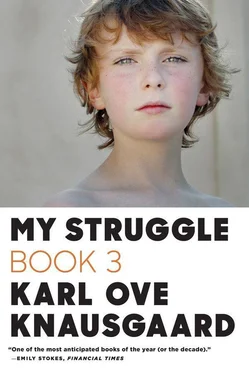Once Dad had almost been on TV, they had interviewed him and so on, about something political, but when we watched the news there was nothing, and the item didn’t come the next day, either, although we all gathered again to see it. However, he had been on the radio once, interviewed in connection with a stamp exhibition, I forgot all about it, so when I arrived home that day, it had already been broadcast and he had a go at me.
Many of the teachers chattered on about my name at first, they were colleagues of my father, I suppose, and assumed I was named after him, and I really liked that, their knowing about me, that I was the son of my father. From the very first day I did my utmost at school, above all in order to be the best in the class, but also because I hoped it would reach Dad’s ears how smart I was.
I loved school. I loved everything that went on there and the rooms where it went on.
Our chairs, low and old, made with iron piping, a slab of wood to sit on, and one to lean back against, our desks covered with cuts and ink from all those who had sat at them before. The board, the chalk, and the sponge; the letters that grew from the chalk in Frøken’s hand, an O, a U, an I, an E, an Å, an Æ, always white, which her hands soon became as well. The bone-dry sponge that darkened and swelled when she rinsed it in the sink, the great feeling it gave you when it rubbed out everything, leaving a trail of water that remained there for a few minutes, until the board was as green and pristine as before. Frøken, who spoke in Karmøy dialect, had big glasses and short hair, wore blouses and skirts, so much she asked us about and told us. She taught us not to speak all at the same time, and not just to shout out an answer but to put our hands up and speak only after she had pointed or nodded to us. Because at the beginning a forest of hands shot up in the classroom, waving impatiently to and fro, with students shouting me, me, me, because she didn’t ask us difficult questions, only ones everyone could answer. Then there were the breaks and all that happened in them, all the children who were there, large groups assembling and dispersing, activities blazing up and dying back. The pegs in the corridor outside the classroom where we hung our jackets, the smell of ten years of green soap, the smell of piss in the toilets, the smell of milk in the milk lockers, the smell of twenty lunch boxes with a variety of smørbrød being opened at the same time in a classroom. The system of monitors, whereby every week a pupil was responsible for handing out whatever had to be handed out, cleaning the board after the lesson, and collecting the cartons of milk in the long break. The feeling this gave you of being the chosen one. And the very special feeling of walking down the corridors when everyone else was sitting in class, how deserted they were, jackets hanging from the pegs on both sides, the low mumble from the rooms as you walked past, the shafts of daylight that lent the linoleum floor a dull gleam, and on sunny days caused thousands of specks of dust in the air to shimmer, like a miniature Milky Way. A door being thrown open, a boy charging out, could change the atmosphere down the entire length of the corridor, suck up all the attention and significance: suddenly he was all that counted. As though he drew in all the smells, all the dust, all the light, all the jackets, and all the mumbling, like a comet in the sky, one might imagine, where all the passing flotsam and jetsam were sucked into its long, pallid — by comparison with the shining center — tail.
I loved the moment when Geir rang the bell and we wandered up to the supermarket, the competition that had already evolved there, where you had to arrive early and put your satchel as far to the front of the queue as possible so that you could get the best seat on the bus. I loved waiting by the shop and watching the other kids drifting in from all sides. Some of them lived right at the top of the estates behind the shop, others came from down in Gamle Tybakken, and others still from the estates on the flat land beyond the hill. I especially loved watching Anne Lisbet. Not only did she have shiny black hair, she also had dark eyes and a big, red mouth. She was always so happy, she laughed so much, and her eyes, they were not only dark, they sparkled, as though she had so much happiness inside her they were always filled to the brim with it. Her red-headed friend was called Solveig, they were neighbors and were always together, just like Geir and me. Solveig was pale and had freckles, she didn’t say much, but she had kind eyes. They lived on the highest estate in Tybakken, in an area I had only visited a couple of times and where I knew no one. Anne Lisbet had a sister who was one year younger, she informed us when it was her turn to talk about herself in class, and a brother who was four years younger. Another boy in the class lived up there, his name was Vemund, he was a little plump and slow, perhaps even slowwitted, he was the last to run, the weakest, threw a ball like a girl, was useless at soccer, couldn’t read, but he liked drawing and most of the other things you could do sitting indoors. His mother was a big, strong, energetic woman with angry eyes and a piercing voice. His father was thin and pale and walked on crutches, he had some kind of muscle disease, and he was a hemophiliac, Vemund proudly told us. A hemophiliac, what’s that? someone asked. That’s when the blood doesn’t stop coming out, Vemund explained. When Dad has a cut and it starts bleeding, it never stops, it just bleeds and bleeds, so he has to take some medicine or go to hospital, and if he doesn’t he dies.
Anne Lisbet, Solveig, and Vemund’s neighborhood, where lots of other children lived, one or two years older or younger than us, was drawn into our world when we started school. The same applied to all the other neighborhoods where my classmates lived. It was as if a curtain went up, and what we had assumed was the whole stage turned out to be only the proscenium. The house on the hillside, whose completely level garden we could see from the top, balancing as it were on the edge of a white wall that plunged straight down, maybe five meters, with a green wire fence on top, was no longer just a house but the house where Siv Johannesen lived. Fifty meters further away, behind the dense forest, a road came to an end, and it was along there that Sverre, Geir B, and Eivind lived. A bit further down, but in a very different area, a very different world, lived Kristin Tamara, Marian, and Asgeir.
They all had their places, they all had their friends, and in the course of a few weeks at the end of the summer everything was opened to us. It was both new and familiar, we looked similar, we did the same things and were thus open to one another. Yet at the same time each one of us had something of his or her own. Sølvi was so shy she could barely talk. Unni worked at the market with her parents and brothers every Saturday, selling vegetables they had grown themselves. Kristin Tamara wore glasses with a patch over one eye. Geir Håkon, who had always been so tough, stood writhing with embarrassment in front of the blackboard. Dag Magne had a permanent grin on his face. Geir had received the last rites when he was born because they thought he was going to die. Asgeir always smelled vaguely of piss. Marianne was as strong as a boy. Eivind could read and write and was so good at soccer. Trond was small and ran like lightning. Solveig was so good at drawing. Anne Lisbet’s father was a diver. And John, well, he had more uncles than anyone else.
One day, when we had been at school for the first three lessons, and the bus had dropped us off by the supermarket at twelve, Geir and I walked home with John. The sun was shining, the sky was blue, the road dry and dusty. When we came to John’s house, he asked if we wanted to go up and have some juice. We did. We followed him up to the veranda, took off our satchels, and sat down on the plastic chairs they had. He opened the door to the house and shouted.
Читать дальше












